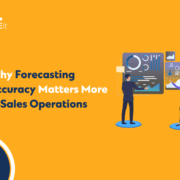Is GenAI suffering from Hallucination?

First of all, I want to mention that AI has opened a brand-new world, addressing key challenges faced by sales teams, such as reducing time spent on research, communication, administration, and documentation of their daily work. Tools like call note takers, email content creation and correction using ChatGPT, and meeting administration solutions are transforming how salespeople operate, and the list could go on.
On my endeavor to transform iSEEit into a trusted AI companion, I have come across some interesting facts that we all need to be aware of.
One key observation is something that all generative AI (GenAI) solutions have in common:
The hallucination factor
AI hallucination, a phenomenon where AI models generate information that sounds accurate but is fundamentally incorrect, poses significant challenges. A prime example of this occurred during a video call with a CRO. The AI note-taker, designed to capture key points, misinterpreted a 20 million growth target as a 15% increase.
The root of this misinterpretation lies in the AI’s misunderstanding of context. The CRO mentioned the current Annual Recurring Revenue (ARR) as 20 million and the need to double it. However, the AI, lacking the nuanced understanding of business terminology, misconstrued “doubling the ARR” as a 15% increase. This oversight could have led to significant miscalculations in business impact and ROI assessments.
Such instances highlight the importance of human oversight and critical thinking when working with AI. While AI can significantly augment human capabilities, it’s crucial to recognize its limitations and avoid relying solely on its output.
You can the phrase “If you don’t have information, please don’t answer” to your prompt . It will not turn off the hallucination completely, but will make the LLM prioritize responding only with verified information or specifying when it lacks certain information.
Another important factor is

Confidentiality and Data Sensitivity:
As we increasingly rely on Generative AI (GenAI) tools, it’s crucial to be aware of the potential risks to data privacy and security. A significant concern is the widespread practice of AI vendors, including operating system providers and social media giants like Meta and LinkedIn, utilizing user data to train their AI models.
This means that any information shared with these AI tools, including personally identifiable information, trade secrets, and proprietary data, could potentially be used to train the AI models. This raises serious concerns about data security and privacy.
Consider the following scenarios:
- Accidental Data Exposure: Imagine a team of brilliant engineers at Samsung, diligently working on the next groundbreaking innovation. In a moment of haste, while using an AI debugging tool, a critical error occurred. Unknowingly, confidential source code was exposed to the tool’s servers. This incident serves as a stark reminder of the importance of data security, even when leveraging advanced AI technologies.
- Unintentional Information Sharing: Imagine you’re having a secret meeting about a new product. You use an AI tool to help you create a presentation. But what if that AI tool accidentally shares your secret ideas with someone else? That’s why it’s important to be careful when using AI tools, especially when discussing sensitive information.
- Data Privacy Risks in Translation: A multinational corporation, eager to expand its operations into new markets, decided to leverage AI translation tools to expedite the process of translating confidential contracts. While this seemed like a time-saving solution, it inadvertently put the company’s sensitive information at risk. The AI tool, designed to translate text accurately, lacked the ability to discern confidential information. As a result, it processed and translated the contracts, potentially exposing sensitive clauses, proprietary information, and financial details. This incident serves as a stark reminder of the importance of carefully considering data security when using AI tools, especially when handling confidential documents.
To mitigate these risks, it’s essential to educate sales and marketing teams about the importance of data privacy and security when using AI tools. They should be advised to:
- Avoid Sharing Sensitive Information: Refrain from sharing confidential information about the company, partners, clients, or products with AI tools.
- Use Anonymized Data: If necessary to use AI for specific tasks, anonymize sensitive data before inputting it into the AI tool.
- Stay Informed: Keep up to date on the latest AI developments and best practices for data privacy and security.
- Choose Reputable AI Providers: Select AI vendors with strong data privacy and security policies.
By understanding the potential risks and taking proactive measures, businesses can harness the power of AI while safeguarding their valuable data.
To maintain the anonymity of data you can use following tools –
- OpenRefine: A powerful data cleaning and transformation tool that can be used to anonymize sensitive data. https://openrefine.org/
- PrivacyBee: A user-friendly tool that can anonymize personal data and other sensitive information. https://privacybee.com/
- Google Docs: Find & Replace feature of Google Docs help maintain the sensitive information by replacing them into generic terms. https://workspace.google.com/intl/en_in/products/docs/
Remain the Human Touch
In my test with automated communication with clients we came across a few factors, which showed some weaknesses like the
Inability to really understand the conversion in depth: AI can help generate personalized messaging, but it doesn’t fully know your clients. The lack of deep personal understanding can lead to generic or even inaccurate personalization attempts.
Adapting to Client Feedback in Real-Time
While GenAI tools are excellent at providing template responses, they often struggle to adapt to real-time feedback or unexpected shifts in client conversations. Overreliance on AI-generated responses can lead to impersonal and robotic interactions, potentially missing crucial cues and damaging long-term relationships.
A funny note story from our sales team when our GenAI generated email met an automated responder it really showed how the “engines” talked passed each other.
Salespeople should remain actively engaged in conversations, leveraging AI as a tool for initial preparation and data analysis. By combining the efficiency of AI with their own interpersonal skills, salespeople can effectively navigate the dynamic nature of client interactions. Human intuition, empathy, and the ability to read between the lines are essential for building strong, lasting relationships.
Conclusion: Humans and AI – A Powerful Partnership
While GenAI is a game-changer for sales teams, making many tasks more efficient, it’s essential to remember that AI is a tool to support human expertise, not replace it. The human being touch—the ability to listen, empathize, and adapt in real-time—is irreplaceable in building strong client relationships.
AI has come to stay, but so have human salespeople. By combining the efficiency of AI with the creativity, intuition, and empathy that only humans bring, sales teams will thrive in this new AI-driven world. Together, humans and AI can create a future where sales are not only faster but smarter and more personalized. Let’s embrace both innovation and the value of human connections.













helloI really like your writing so a lot share we keep up a correspondence extra approximately your post on AOL I need an expert in this house to unravel my problem May be that is you Taking a look ahead to see you
I just could not depart your web site prior to suggesting that I really loved the usual info an individual supply in your visitors Is gonna be back regularly to check up on new posts
Your writing is like a breath of fresh air in the often stale world of online content. Your unique perspective and engaging style set you apart from the crowd. Thank you for sharing your talents with us.
Your writing is like a breath of fresh air in the often stale world of online content. Your unique perspective and engaging style set you apart from the crowd. Thank you for sharing your talents with us.
Thank you for the auspicious writeup It in fact was a amusement account it Look advanced to more added agreeable from you By the way how could we communicate
Your blog is a constant source of inspiration for me. Your passion for your subject matter is palpable, and it’s clear that you pour your heart and soul into every post. Keep up the incredible work!
먹튀검증사이트: chunjusa.org
Wow amazing blog layout How long have you been blogging for you made blogging look easy The overall look of your web site is magnificent as well as the content
Your writing is a true testament to your expertise and dedication to your craft. I’m continually impressed by the depth of your knowledge and the clarity of your explanations. Keep up the phenomenal work!
Что ожидать после процедуры, узнайте.
ботулинотерапия http://botox.life/ .
Промокод 1хБет 2025 поможет приумножить приветственный бонус со 100% до 130% на сумму которая достигает 32 500 ?, используйте его при регистрации и гарантированно получите доступ к спортивному бонусу и бесплатным ставкам. На этапе заполнения личных данных вы можете выбрать 1xBet бонус для слотов и казино на сумму до 1500€ и 150 бесплатных вращений. В этой статье вы получите полную информацию про бонусные акции 1хБет для новых игроков.
Промокод 1xBet 2025 — Получите 100% на Депозит до 32 500 руб:
https://yoko-shop.ru/files/pgs/?1xbet-promokod-pri-registracii__bonus.html
1xBet является одной из основных и лидирующих букмекерских контор во всех странах. Именно 1xBet выбирают все игроки из-за выгодных условий сотрудничества, низких марж, широкого выбора линии спорта и постоянных акций как для новых пользователей, так и постоянных.
Букмекерская контора 1xBet считается самой щедрой и выгодной из-за того, что постоянно выдает промокоды своим игрокам, разыгрывает хорошие призы и подогревает интерес к игре у пользователей ежедневными акциями.
Для новичков 1xBet предлагает бонусный код, который можно использовать на протяжении всего 2025 года. 1хБет промокод, при его введении во время регистрации можно получить увеличенный бонус до 32 500 RUB за первый депозит и играть первые 30 дней за счет букмекера. В чем важность промокода и почему за ними все так гонятся? Промокод является ключом, который открывает доступ к получению бонусов, бесплатных ставок, участие в турнирах и многие прочие привилегии на платформе.
1xBet промокод при регистрации – эксклюзивный код для получения бонуса в разделе казино на сумму 128 000 рублей и 150 фриспинов. Именно при использовании этого кода вы сможете увеличить сумму спортивного бонуса на 30% и получить доступ к совершению бесплатных ставок. Вы можете использовать этот бонус для ставок на спортивные события. Отыгрыш выполняется в течение 30 дней на экспресс-ставках с 5-кратным вейджером. Для отыгрыша на слотах первые 4 депозита начисляются и отыгрываются каждые 7 дней.
Для новых игроков промокод на приветственный бонус открывает возможность ощутить всю атмосферу игры изнутри не вкладывая свои деньги, тем самым показывая, что им можно доверять в игре, и помимо удовольствия, получать еще и хорошие деньги от выигрышей. Если же речь идет о постоянных игроках, то они уже знают все изнутри, и именно поэтому постоянно в поисках промокода на сопутствующих сайтах с похожей тематикой, либо в разделе “Витрина промокодов” на сайте, ведь с использованием когда можно не тратя своих средств, поднять хорошие деньги за 10 минут. Далее в статье мы более детально разберем все нюансы использования промокода, какие привилегии он дает для игроков и почему важно их использовать в игре.
I loved as much as youll receive carried out right here The sketch is attractive your authored material stylish nonetheless you command get bought an nervousness over that you wish be delivering the following unwell unquestionably come more formerly again as exactly the same nearly a lot often inside case you shield this hike
Your blog is a shining example of excellence in content creation. I’m continually impressed by the depth of your knowledge and the clarity of your writing. Thank you for all that you do.
Hi Neat post There is a problem along with your website in internet explorer would test this IE still is the market chief and a good section of other folks will pass over your magnificent writing due to this problem
obviously like your website but you need to test the spelling on quite a few of your posts Several of them are rife with spelling problems and I to find it very troublesome to inform the reality on the other hand Ill certainly come back again
I was recommended this website by my cousin I am not sure whether this post is written by him as nobody else know such detailed about my trouble You are amazing Thanks
What i do not realize is in fact how you are no longer actually much more wellfavored than you might be right now Youre very intelligent You recognize thus considerably in relation to this topic made me in my view believe it from numerous numerous angles Its like men and women are not fascinated until it is one thing to do with Lady gaga Your own stuffs excellent All the time handle it up
Wow superb blog layout How long have you been blogging for you make blogging look easy The overall look of your site is magnificent as well as the content